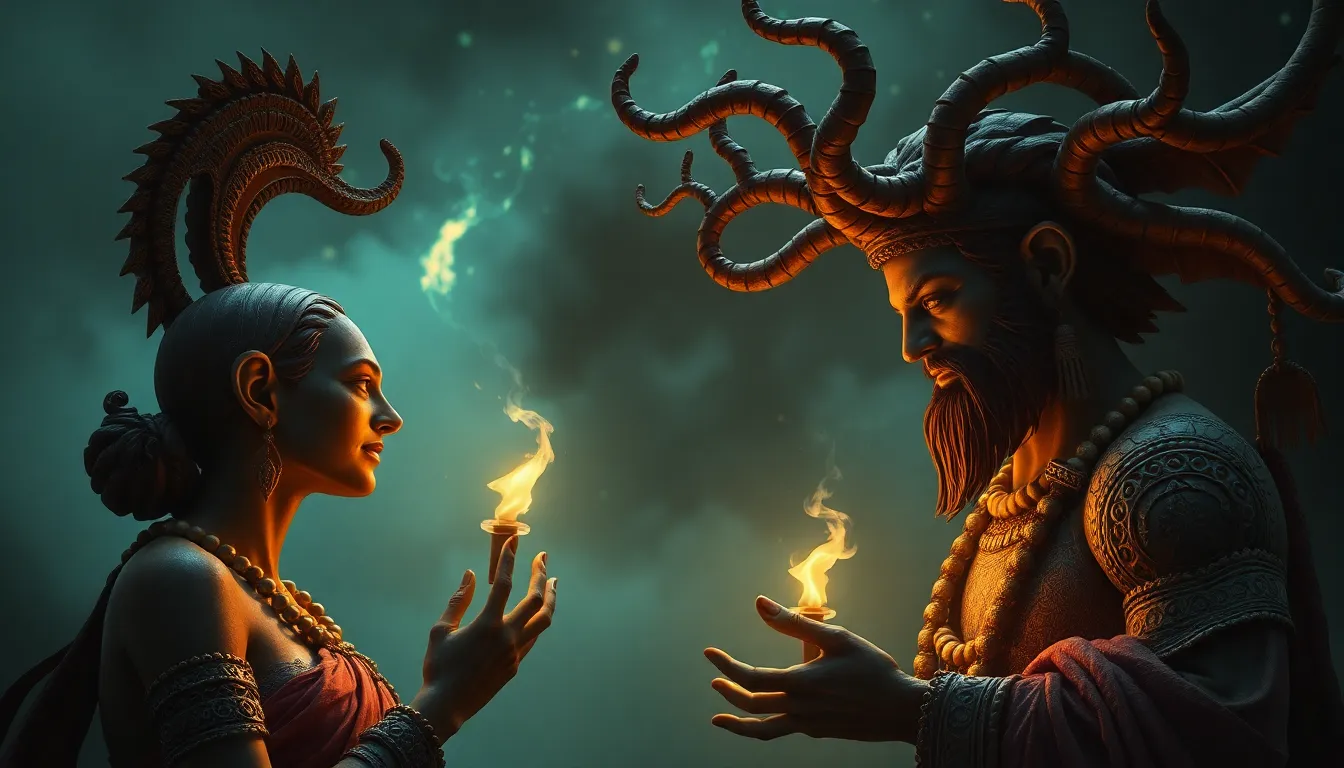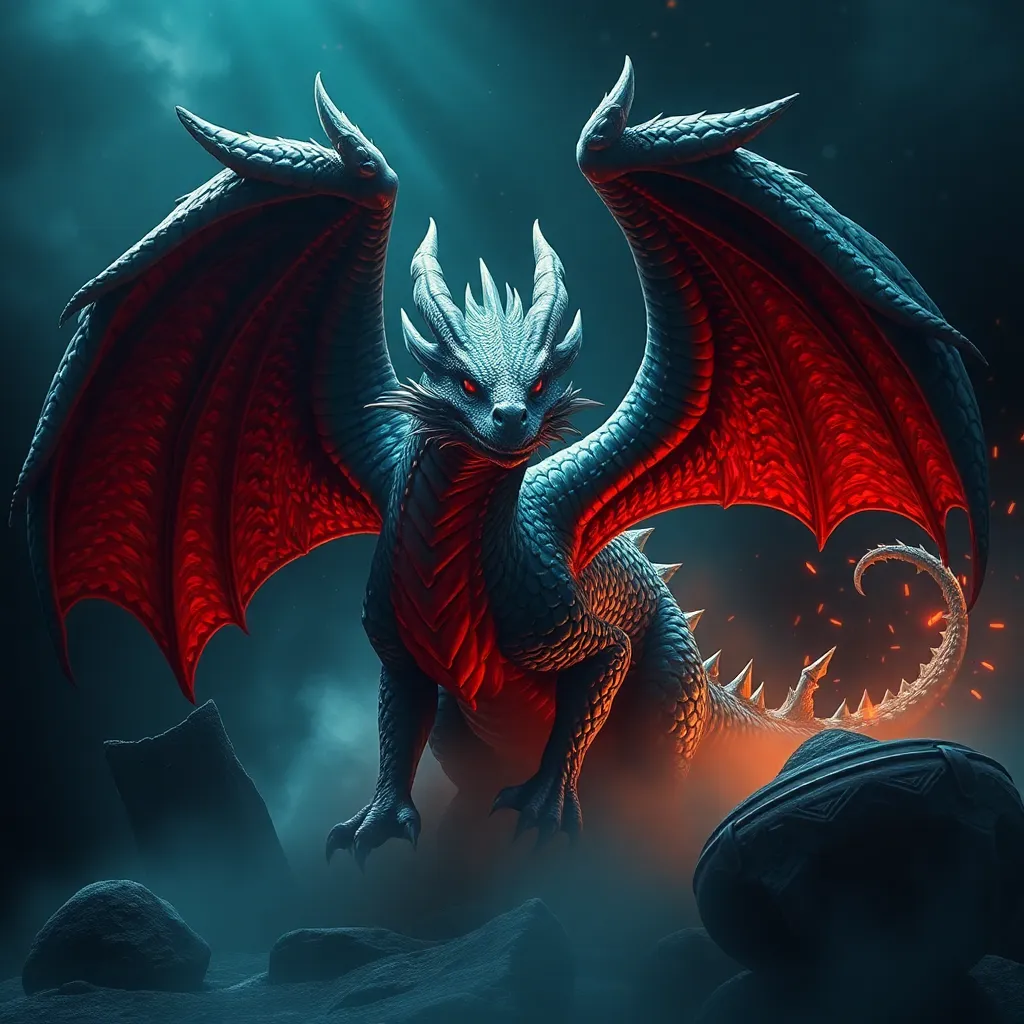The Role of Ancient Deities in Shaping Human Relationships
I. Introduction
Ancient deities have played a significant role in human culture, serving as embodiments of natural forces, moral codes, and social ideals. From the majestic pantheons of Greece and Rome to the rich mythologies of Egypt and Hinduism, these divine figures have influenced human relationships and societal structures throughout history.
The impact of mythology on social structures cannot be understated. Myths have shaped how individuals understand their roles within families, communities, and nations. This article aims to explore the various ways ancient deities have influenced human relationships, providing insights into love, family dynamics, social hierarchies, and contemporary relevance.
II. Ancient Deities Across Civilizations
Throughout history, numerous civilizations have worshipped a diverse array of deities. Here is an overview of some major pantheons:
- Greek Pantheon: Featuring gods like Zeus, Hera, and Athena, the Greeks attributed human-like qualities to their deities.
- Roman Pantheon: Many Roman gods, such as Jupiter and Venus, were directly borrowed from Greek mythology, showcasing the interconnectedness of these cultures.
- Egyptian Pantheon: Deities like Osiris, Isis, and Horus played crucial roles in the afterlife and the natural world, influencing daily life and governance.
- Hindu Pantheon: With a vast array of gods and goddesses including Vishnu, Shiva, and Durga, Hinduism emphasizes a complex relationship between the divine and human realms.
Common themes among these deities include creation, love, war, and justice. While the characteristics of these gods vary, their roles often reflect the values and concerns of the societies that worshipped them.
For example, both Greek and Roman deities often displayed human emotions and flaws, while Hindu deities might embody cosmic principles and moral lessons. This comparison illustrates how different cultures address universal human experiences through their divine narratives.
III. The Influence of Deities on Love and Romance
Many ancient deities are specifically associated with love and attraction. Notable examples include:
- Aphrodite: The Greek goddess of love, beauty, and desire, often depicted as the ultimate symbol of romantic allure.
- Eros: The Greek god of love, representing physical attraction and desire, frequently intervening in the lives of mortals.
- Venus: The Roman counterpart to Aphrodite, symbolizing not only romantic love but also fertility and prosperity.
Myths surrounding these deities often illustrate divine intervention in human relationships. For instance, the story of Cupid (Eros) and Psyche underscores themes of love overcoming obstacles and the importance of trust and fidelity.
Rituals dedicated to love deities were common across cultures, including:
- Festivals celebrating love and fertility.
- Offerings made to deities for blessings in romance.
- Rites of passage for couples seeking divine favor.
IV. Deities and Family Dynamics
Family dynamics were deeply influenced by deities representing motherhood and familial relations. Deities such as:
- Hera: The Greek goddess of marriage and family, symbolizing fidelity and the sanctity of the marital bond.
- Isis: The Egyptian goddess of motherhood and fertility, revered for her nurturing qualities.
Mythological narratives often emphasize familial bonds and conflicts, highlighting the challenges faced by families. For example, the story of Hera and Zeus showcases both the power dynamics and complexities within marriage.
These deities significantly influenced cultural norms surrounding marriage and parenting, reinforcing ideals of loyalty, respect, and the familial hierarchy that continue to resonate in modern societies.
V. Deities and Social Hierarchies
Deities have historically played a pivotal role in establishing social order and class structures. Many cultures believed in the divine right of kings, where rulers were seen as chosen by the gods. This belief reinforced the legitimacy of their authority and the hierarchical nature of society.
Notable examples include:
- In ancient Egypt: Pharaohs were considered gods on earth, their rule justified by divine mandate.
- In ancient Rome: Emperors were often deified after death, establishing a connection between governance and the divine.
Myths often reinforce social hierarchies; for instance, tales of gods punishing mortals for hubris serve as cautionary tales about the importance of respecting one’s place in society. Conversely, some myths challenge these hierarchies, illustrating the potential for change and social mobility.
VI. Deities and Conflict Resolution
The role of deities in warfare and treaties has been significant throughout history. Gods such as:
- Mars: The Roman god of war, representing the brutality and honor of battle.
- Athena: The Greek goddess of wisdom and warfare, embodying strategic prowess and justice.
Myths often depict divine involvement in human conflicts, illustrating how deities influenced both warfare and reconciliation. For example, the Trojan War narrative reflects not only the chaos of conflict but also the potential for resolution through divine intervention.
Rituals for seeking favor from war deities included:
- Offering sacrifices before battles.
- Prayers for peace and victory.
- Ceremonies to honor fallen warriors.
VII. Gender Roles and Deities
The exploration of male and female deities reveals much about gender dynamics in ancient societies. Male deities often embodied traits associated with strength and authority, while female deities represented fertility, nurturing, and domesticity. This dichotomy reflects and shapes perceptions of masculinity and femininity.
Myths often reinforce traditional gender roles, but they can also challenge societal norms. For instance, tales of powerful goddesses like Athena and Freyja demonstrate women’s agency in a male-dominated world.
Over time, the roles of deities have evolved, influencing modern perceptions of gender relations and the ongoing discourse surrounding equality and empowerment.
VIII. Deities in Modern Relationships
The legacy of ancient deities continues to influence contemporary relationship dynamics. Many modern interpretations and adaptations of ancient myths resonate with current social issues, reflecting timeless human experiences.
In popular culture, ancient deities appear in literature, film, and art, often reimagined to address contemporary themes of love, conflict, and identity. Their continued relevance in psychology, particularly in understanding archetypes and human behavior, underscores the enduring impact of these ancient figures.
IX. Case Studies: Specific Deities and Their Impact
To illustrate the enduring influence of ancient deities, we can examine a few key figures:
- Zeus: As the king of the Greek gods, Zeus’s narratives reflect themes of power, authority, and the complexities of male leadership.
- Freyja: The Norse goddess of love and war, Freyja embodies the duality of feminine power, influencing both romantic and martial realms.
These stories not only shaped the cultures that revered them but also continue to resonate in modern discussions about authority, love, and the human condition. The myths surrounding these deities provide valuable insights into the nature of relationships and the moral lessons that have persisted through time.



